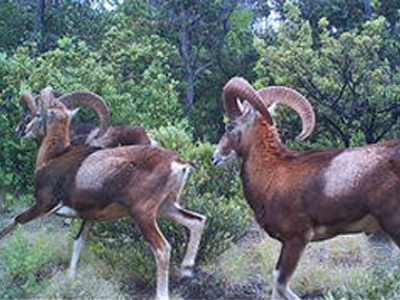Managing non-native game mammals to reduce future conflicts with native plant conservation in Hawaiʻi
Landscape-scale conservation of threatened and endangered species is often challenged by multiple, sometimes conflicting, land uses. In Hawaiʻi, efforts to conserve native forests have come into conflict with objectives to sustain non-native game mammals, such as feral pigs, goats, and deer, for subsistence and sport hunting. Maintaining stable or increasing game populations represents one of the greatest obstacles to the recovery of Hawaii’s 425 threatened and endangered plant species. Many endemic Hawaiian species have declined and become endangered as a result of herbivorous non-native game mammals. Meanwhile, other environmental changes, including the spread of invasive grasses and changing precipitation patterns and wildfire regimes could further interact to alter the distribution and range of native plants.
This project will address the need to optimally balance long-term endangered plant recovery with non-native game management. Focusing on the islands of Maui and Lānaʿi, researchers will map the distribution of game species and native plant species, then use these maps to identify zones that would be optimal for plant conservation, and others for game management. This analysis will take into account both the current distribution and potential future distribution of game and plant species, as climate conditions change. The results of this project will support both federal and state land managers in Hawaiʿi. The U.S. Fish and Wildlife Service can use these results to inform locations for the conservation and recovery plans for federally-listed species, while the State of Hawaiʿi Division of Forestry and Wildlife can use the results to prioritize places for game management.

PROJECT DETAILS
FUNDED:
FY2018
PI:
Steve Hess
Research Wildlife Biologist, USGS Pacific Islands Ecosystem Research Center

